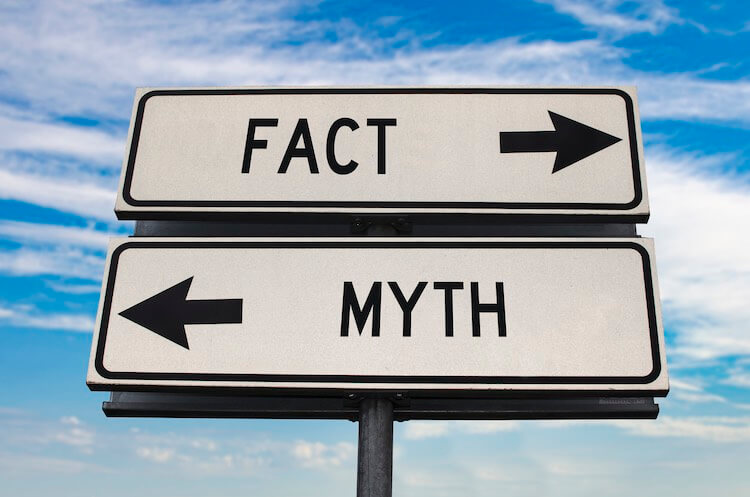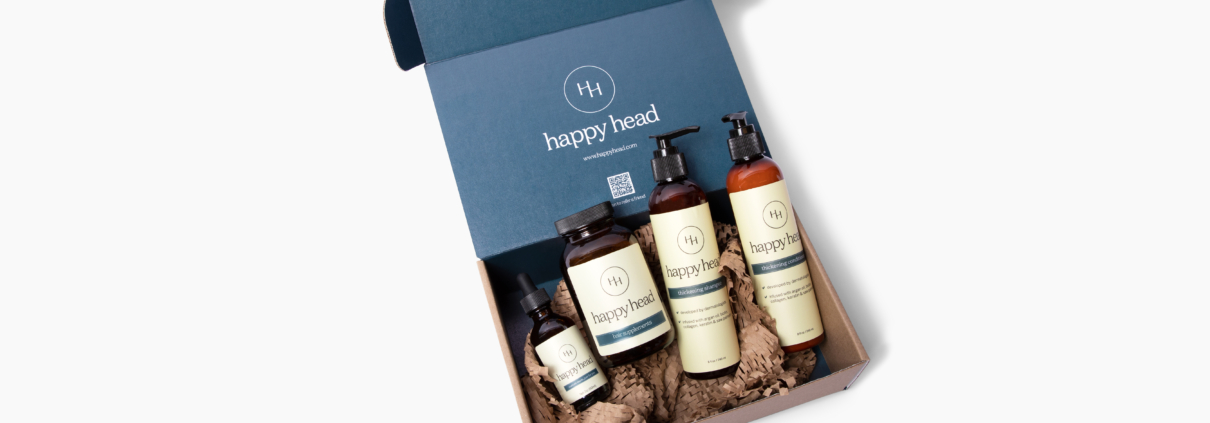Debunking the Myths About Hair Loss

Legend has it that Samson, the biblical hero, needed his hair to give him his strength. After his hair loss, Samson was said to have lost his superhuman power. Although this tale has no basis in reality (no, your hair does not give you power), the Samson story may have added to the myth that long, thick hair was proof of virility and fertility. While most people know that the hair on your head is not directly related to your strength and power, there are other hair myths that remain. In this article, we’ll focus on debunking the myths of hair loss and affirm some facts along the way.
What Are the Facts & the Myths About Hair Loss?
Losing your hair can be caused by a myriad of factors, so preventing hair loss takes a multi-pronged approach. One example is a person’s diet. While specific vitamins and minerals are necessary for healthy hair, a poor diet won’t make you bald. It can, however, cause your hair to start thinning. Using the right hair products, consuming hair-friendly nutrients, and taking a proactive approach to hair growth, to prevent hair loss, can even help regrow your hair. Let’s explore seven common myths about hair loss.
1. Your mother is the reason for your hair loss.
The myth that you inherit baldness from your mother is false, at least half the time. While it’s true that genetics play a major role in male pattern baldness and female pattern baldness, you can inherit the condition from either of your parents. Androgenic alopecia, for example, is a hair loss condition with strong genetic links. But where that genetic link comes from is not that easy to explain.
For example, men get their X chromosome from their mother and the Y chromosome from their father. And although the gene most associated with baldness – the AR gene – is found on the X chromosome, there are 63 other genes responsible for hair loss. You may be surprised that only six of those genes are on the X chromosome. So, you might blame your mother for a lot of things during therapy, but hair loss shouldn’t be one of them! (01)
2. Baldness only happens with age.
Middle-aged adults do not have a monopoly on hair loss. Studies show that about 16% of young adult males ages 18 to 29 have moderate to severe hair loss, so losing hair can happen at any age. Some men can start losing hair in adolescence.
People who have a genetic predisposition to hair loss start losing hair as early as their teens or twenties, decades before most people expect the loss to occur. The signs are there decades before they may notice. So, if you suspect you might be losing your hair, it’s always advisable to consult a professional as soon as possible.
3. Hair suffocates under a hat.
Some people will tell you that wearing a hat leads to hair loss because headwear can “suffocate” your hair. First of all, your follicles and hair strands do not breathe. Therefore, you can’t suffocate the hair off your head.
You can, however, experience traction alopecia if your hat or hairstyle constantly pulls at your hair. Over time, repeated pressure or friction may lead to hair follicle damage or hair loss. In addition, a tight fit can restrict blood flow if worn daily, which may prevent vital nutrients from getting into hair follicles. While wearing a hat is fine, make sure to wear one that’s not constricting or abrasive to your scalp.
4. Only men experience severe hair loss.
Hair loss, even balding, is not a condition isolated to men. According to the American Academy of Dermatology, women also struggle with hair loss. Because, for all genders, the cause is typically genetic. Also, both men and women see thinning hair with age. The difference is how the person loses their hair. (02)
Men tend to lose hair in a very specific area, like at the hairline or the top of the head. On the other hand, women lose hair evenly and diffusely throughout the scalp. And, unlike men, women have historically had more options to disguise their hair loss in the form of wigs, weaves, and other cosmetic measures to cover baldness. In short, women also experience severe hair loss — albeit with significant differences.
4. Stress causes baldness.
Does stress cause baldness? This myth is a little tricky. While stress by itself doesn’t cause baldness, it does cause hair loss. Telogen effluvium, a common hair loss condition, occurs due to severe and persistent stress. Anything from job loss to illness can trigger a stress response, which may result in hair loss.
Telogen effluvium is also known as “club hair” due to the shape of hairs at the root. Hair loss happens throughout the head and does not typically cause complete baldness. The condition can impact any person at any age as long as they’ve experienced significant stress or sickness. Fortunately, in most cases, hair loss during telogen effluvium grows back after the stress has resolved. (03)
5. Men who go bald have too much testosterone.
Although it may provide some comfort to think you’re losing your hair because you’re too manly, the truth is not that simple. Elevated levels of testosterone do not lead to baldness. However, testosterone does play an indirect role when it comes to hereditary hair loss.
Dihydrotestosterone (DHT) is a sex hormone that’s converted from testosterone. Hair follicles are affected by DHT. And some people are genetically inclined to have follicles that are exceptionally sensitive to the hormone, causing hair follicles to shrink in size and unable to grow healthy hair. (04) To combat the conversion of Testosterone into DHT, you need a custom hair treatment that targets the hormone.
6. Certain hairstyles will cause you to go bald.
Your mousse and gel routine will not cause baldness, no matter how many bottles of product you go through. That said, some hairstyles may cause your hair too thin. For example, heated hair tools and tight braids can cause breakage, causing thinner hair. Once stopped, however, hair typically grows back normally.
Coloring, bleaching, or perming your hair also does not cause you to go bald, though it may damage the hair and lead to thinning. In most cases, the hair grows back once the coloring or perming ends. Remember, any hair products that cause severe scalp injuries can result in permanent bald patches.
7. Brushing your hair will encourage hair growth.
The myth about brushing your hair 100 times before bed stems from a time when hair conditioner wasn’t available to the masses. In the past, women (and some men) spread hair oils throughout the scalp by brushing repeatedly. This activity kept hair from becoming dry and brittle.
These days, the right shampoo and conditioner do the job that brushing used to do. Maintaining clean hair and a healthy scalp prevents hair loss. Brushing your hair too much, on the other hand, causes breakage and hair loss. While it won’t make you go bald, it may thin out your hair. (05)
The Truth About Hair Loss
Throughout history, hair has always had a mystical quality. Whether it’s the lock of hair placed into a boiling cauldron or Samson’s powerful mane, humans have always assigned myths to hair. Now that we’re done debunking the myths of hair loss, you know your hair isn’t magical — hair growth comes down to science.
Happy Head takes the mystery out of hair loss. All of our doctors are board-certified dermatologists specializing in hair growth. Our proprietary hair growth formula and hair care products were developed by world-renowned hair loss pioneers: Dr. Ben Behnam and Dr. Sean Behnam. Looking to prevent hair loss or regrow your hair? Take the questionnaire and get started your customized hair loss program today.
Resources:
(01) https://www.healthline.com/health/baldness-gene
(02) https://www.aad.org/public/diseases/hair-loss/causes/18-causes
(03) https://www.ncbi.nlm.nih.gov/books/NBK430848/
(04) https://www.medicalnewstoday.com/articles/68082#Hair-growth-and-hair-loss
(05) https://www.ncbi.nlm.nih.gov/pmc/articles/PMC5419032/



